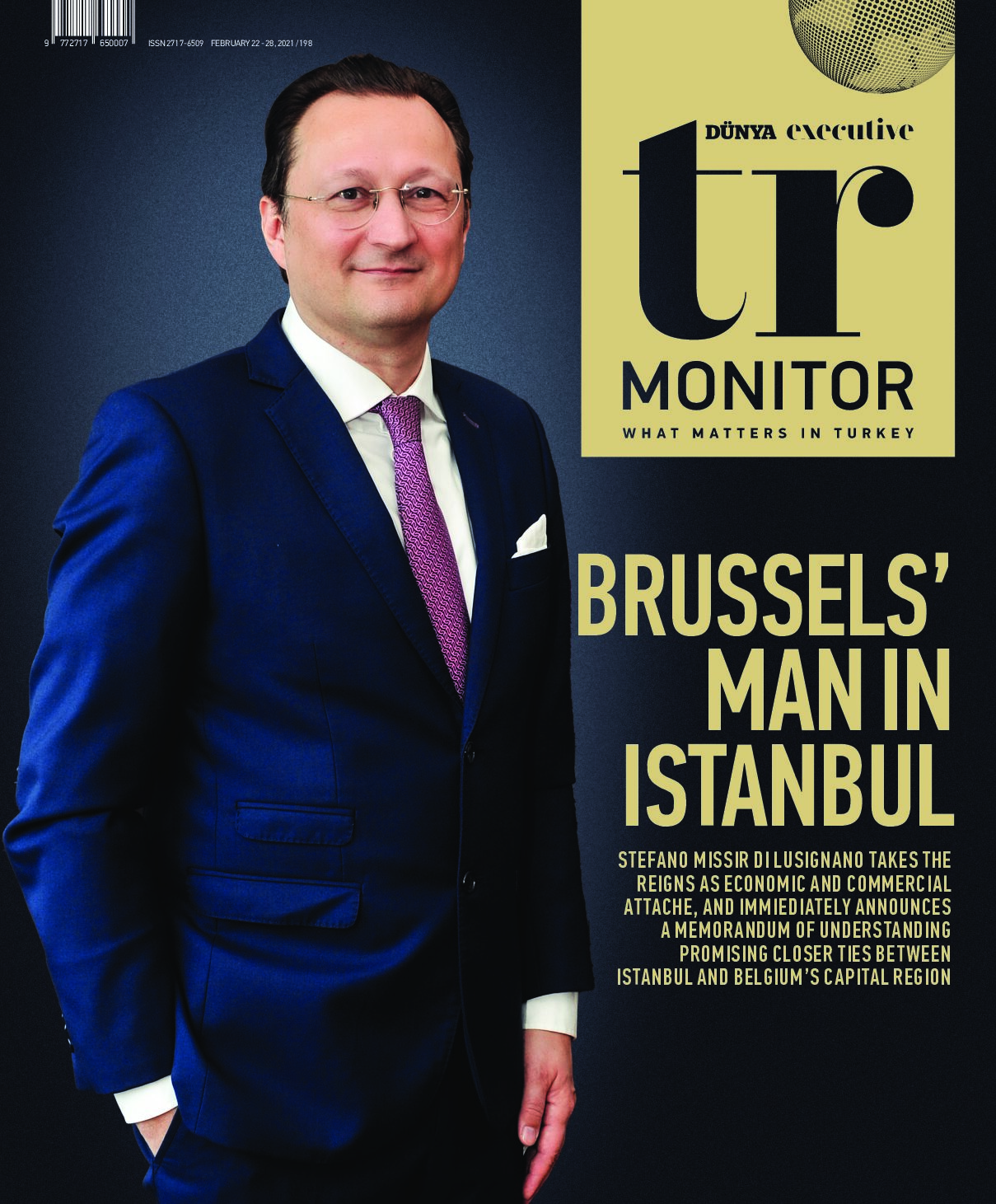BRUSSELS, the Belgian capital, is a small city but have been represented by a trade office in Istanbul for 20 years. The hub.brussels, the economic and commercial representation of the Brussels’ Government, the smallest of the three regions of the federal Belgium but the most cosmopolitan one with access to whole Europe, has marked its 20th year in Turkey with a Memorandum of Understanding (MoU) signed with the Istanbul Metropolitan Municipality. Mutually developed projects in areas of interest for the both parties will be represented at the international organizations where both cities are members. Although it is not the main target of the collaboration, projects will create mobility, increase awareness thus pave the way for new economic activities and investments according to Stefano Missir di Lusignano, Economic and Commercial Attaché Representing the Brussels’ Government. Missir di Lusignano also heralds a new MoU to be signed with another Turkish metropolis, which will be announced soon.
Missir di Lusignano’s post in the position is quite new, he has been managing the Istanbul office since last October. However, he is not new to Turkey. As he tells, he spent part of his youth in Turkey with frequent visits he made and he comes from a Levantine family that was established in Izmir, Turkey for many years. Considering that the first name occupied the post after the establishment of the office for 15 years, knowing the country for possible business opportunities is important for the Brussels government. “And then there was a colleague for another four years and I’m actually the third one to occupy this post at Istanbul,” Missir di Lusignano says, adding that for this kind of position you need to be in the country for more than two to three years to get enough feedback for increasing trade and possible investments.
Trade relations with Brussels Capital Region represent USD 7 bn, mostly because it is the smallest region of the federal state. The target is to reach USD 10 bn threshold in the next two years. With its 6 million inhabitants, Flanders is the biggest region in Belgium, representing the major part of the business including logistics and industrial network of companies, also home to the port of Antwerp, the second largest in the world. Wallonia, the second one in terms of importance, also have the industrial network.
Where does Brussels Capital Region stay in this picture? It is the smallest region in terms of geography and population, says Missir di Lusignano, but has the advantage to be the capital, to be the most cosmopolitan city and the one that welcomes the seats of the European institutions. “Brussels is a city that decides not only for Europe, but for a market of 500 million people, namely for the rest of the world. As it is the legislation and regulation center for Europe, a decision taken in Brussels impact not only Brussels or Belgian company, but also European and Turkish companies at the end of the day.”
Missir di Lusignano thinks that they had 20 years of strong presence in Turkey, motivated not only by the close ties between Brussels and Istanbul, but also because of the special link with the massive presence of Turkish Belgian citizens live in Brussels. “This has created a lot of special links,” he says. And signing a MoU with Istanbul Metropolitan Municipality was the occasion to reinforce these Turkish Belgian bonds, according to him.
“Taking a look at the last 20 years, we have created bridges between not only Brussels and Istanbul, but all the cities and municipalities in Turkey. Actions have been taken every year with the presence of Belgian business delegation, traveling to Turkey and the other way around.”
Philipp Leopold Ludwig Maria, King of the Belgians, for example, paid three official visits to Turkey in the last 20 years. As the honorary chairman of the Foreign Trade Agency (replacing Belgian Foreign Trade Board-BFTB in 2003) since 1993, he headed more than 60 economic missions until his accession as seventh King of the Belgians in 2013. This shows the strategic position of Turkey and importance of our economic relationships, according to Missir di Lusignano.
Missir di Lusignano says that they started from scratch and today the number Brussels-based companies doing business in Turkey, mostly Istanbul, has reached 10 in the last 10 years. In line with Brussels’ service-oriented economy, most of them are small and medium sized companies. “95% of our companies are small and medium sized, 99% of them doing business in the service sector. Since the production has been pushed out of the capital due to green environment policies, we don’t have huge industries,” he notes.
“It’s a service-oriented economy and we also follow the trends in Turkey, in which the service economy is gaining importance. And Istanbul is a hub to access to the Turkish market in service, technology, research and development,” says Missir di Lusignano underlining the Godiva’s sale to Turkey’s Ulker in 2007 as one of the most important partnerships made in the last 20 years. “We’ll carry on that boat,” he remarks.
Another important milestone in the bilateral trade relations to him was the selection of Istanbul as the European Capital of Culture by the European Union in 2010. “Istanbul opened an office in Brussels and held big promotional activities,” he recalls. “This created some desire by the Brussels citizens to visit Istanbul. We are talking about 400,000 Belgian citizens, 4% of the population is traveling to Turkey every year. This is an important trend to follow-up once the COVID -19 threat is over.”
The trade office in Istanbul for Brussels Capital Region, hub. brussels, has made a kick start to the year with the Joint Economic Trade Committee (JETCO) meeting in January followed by the MoU signed with Turkey’s biggest city, Istanbul.
The second term meeting of the JETCO, which was established in 2013, was held on January 20 and covered a range of issues including bilateral trade and investments, tourism, the contracting and consultancy sector, SMEs, women entrepreneurship, industry, technology, renewable energy, and health tourism. A protocol was also signed between the Turkish Trade Minister Ruhsar Pekcan and Sophie Wilmes, Belgian Deputy Prime Minister and Minister of Foreign Affairs, European Affairs and Foreign Trade and the Federal Cultural Institutions. USD 10 billion annual bilateral trade target was set at the JETCO meeting.
Looking into the year 2021, Missir di Lusignano says that they will hold a couple of webinars in the coming period. “We are going to explain to the Brussels companies how e-commerce has been absolutely improved in Turkey with the pandemic. We are also working on an official visit by the authorities in autumn either to Istanbul or Ankara.”
Speaking about the Turkish investments in Belgium, it is quite limited compared to the Belgian investments in Turkey, Missir di Lusignano says. “Our job includes two different tasks. First, we help Brussels company to put their feet into the Turkish market, and we support them, but also more of our business is to convince Turkish companies to use Brussels as a hub to access the European market.”
In terms of Belgian investments, everything is pending due to pandemic, the Economic and Commercial Attaché says. “According to the recent discussion I had with the Brussels community that have interest to approach the Turkish market, everything is pending, because they need to be on the spot to take the real decision.”
Pandemic has affected the bilateral trade relation, but also the currency with a very strong euro, it was more difficult for the region to sell their products into the Turkish market, Missir di Lusignano says. Some of the Brussels-based companies doing business here took advantage of their position and the extreme rates which was very favorable for them, according to him. “I mean the ones that produce in Turkey and sell to Europe did really well. Economy is like this, there is always a winner. I’m not saying a winner and a loser, but there is always one side that wins a bit more than the others. We are ready to support the companies from both countries to win,” he concludes.
CONCRETE STEPS EXPECTED THIS YEAR
The Memorandum of Understanding signed between the Brussels Capital Region and Istanbul Metropolitan Municipality last week marks the first time that both parties took the step of starting a collaboration based on concrete objectives, according to Stefano
Missir di Lusignano, Economic and Commercial Attaché Representing the Brussels Government. “As a first step we have listed a number of areas where we have common interests, such as urban development, housing, heritage, housing policy, green buildings, economy, intelligent cities, mobility and transport, tourism, science, innovation and creating a dialogue between Turkish and Belgian startups as well as disaster management, public health and culture,” he says. “Now we are going to shortlist some projects where we can start a real and concrete collaboration. It can be women in business, tourism promotion in both cities or in the cultural field, which has been badly affected by COVID-19. We hope to have something concrete completed by the end of this year. So, we are trying to organize visits of our authorities to either Istanbul or Ankara for the end of the year. But the idea is also to bring this common interest to international organizations where both cities are members.”
MUTUAL CONSTRUCTION CONTRACTS ARE POSSIBLE: MISSIR DI LUSIGNANO
“Everything produced in Belgium is made for the export market, because the domestic market of 11 million Belgians is too small. That’s why we find the growing population in Turkey, and the position that Turkey has taken due to shifts created by the pandemic, very interesting. In terms of supply and logistics chains, Turkey can replace Asia and Southeast Asia. It’s really interesting to be here for that reason. Another point that was mentioned in the latest JETCO meeting in January was the opportunities Turkey offers not only in the country but in the surrounding regions, including the Caucasus and Balkans. We are also looking for business collaboration in the construction where we are are quire advanced in Belgium, and in which Turkey has also proven itself. We can find ways to collaborate on the Belt and Road project.”
TURKEY RANKED 15TH FOR IMPORTS TO BRUSSELS CAPITAL REGION IN 2019
>> Exports from Brussels Capital Region to Turkey
2018: EUR 22,183,110
2019: EUR 26,284,886 (18% increase)
>> Imports to Brussels Capital Region from Turkey
2018 : EUR 111,238,786
2019 : EUR 122,456,432 (10% increase)
>> Brussels Capital Region exports chemical products worth EUR 20.6 m. Drug exports alone represent EUR 18m.
>> Turkey ranked 23rd as an export market for Brussels Capital Region in 2019. Turkey ranked 15th for imports to the Brussels Capital Region in 2019
>> Turkey sells transport materials with EUR 62.4m, a 24.1% increase compared to 2018. Passenger vehicles and other motor vehicles are the main items in this group at EUR 61.5 m.
>> Turkey sells base metals and articles of base metals worth EUR 17.3 m. Construction exports and aluminum parts for construction clearly stand out in this category at EUR 10.1m.










